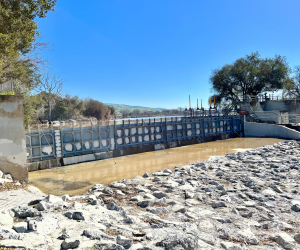Updates on Boeing 737-9 MAX Aircraft
During an all-day safety discussion at FAA Headquarters on Tuesday, FAA Administrator Mike Whitaker informed top Boeing officials that the aircraft manufacturer must develop a comprehensive action plan to address its systemic quality-control issues to meet FAA’s non-negotiable safety standards.
“Boeing must commit to real and profound improvements,” Administrator Whitaker said following the meeting with Boeing Chief Executive Officer and President Dave Calhoun and his senior safety team. “Making foundational change will require a sustained effort from Boeing’s leadership, and we are going to hold them accountable every step of the way, with mutually understood milestones and expectations.”
Administrator Whitaker told Boeing that he expects the company to provide the FAA a comprehensive action plan within 90 days that will incorporate the forthcoming results of the FAA production-line audit and the latest findings from the expert review panel report, which was required by the Aircraft Certification, Safety, and Accountability Act of 2020.
The plan must also include steps Boeing will take to mature its Safety Management System (SMS) program, which it committed to in 2019. Boeing also must integrate its SMS program with a Quality Management System, which will ensure the same level of rigor and oversight is applied to the company’s suppliers and create a measurable, systemic shift in manufacturing quality control.
“Boeing must take a fresh look at every aspect of their quality-control process and ensure that safety is the company’s guiding principle,” Administrator Whitaker said.
Boeing Oversight Activities
On February 12, Administrator Whitaker was on Boeing’s factory floor in Renton, Washington, to see the 737 production line and hear directly from Boeing engineers, mechanics, and others about quality control processes. The Administrator also went to the Alaska Airlines headquarters to discuss the left mid-cabin door plug that blew out of Alaska Airlines Flight 1282 on January 5 while in flight.
The FAA has halted production expansion of the Boeing 737 MAX, is exploring the use of a third party to oversee Boeing, and will wrap up its enhanced oversight audit of Boeing’s production and manufacturing quality systems in the coming weeks. An investigation into Boeing’s alleged noncompliance is also underway.
January 17, 2024
After taking decisive action to ground 171 Boeing 737-9 MAX airplanes, the FAA is now investigating Boeing’s manufacturing practices and production lines, including those involving subcontractor Spirit AeroSystems, bolstering its oversight of Boeing, and examining potential system change.
On Friday, the FAA announced requirements for a rigorous inspection and maintenance process as a new and necessary step before the FAA contemplates any further steps in the process to return Boeing 737-9 MAXs to service. The first 40 inspections that are part of that process are now complete, and the FAA will thoroughly review the data from them. All 737-9 MAX aircraft with door plugs will remain grounded pending the FAA’s review and final approval of an inspection and maintenance process that satisfies all FAA safety requirements. Once the FAA approves an inspection and maintenance process, it will be required on every grounded 737-9 MAX prior to future operation. The safety of the flying public, not speed, will determine the timeline for returning these aircraft to service.
The FAA is supporting the National Transportation Safety Board’s investigation into Alaska Airlines Flight 1282. The NTSB is in charge of the investigation and will provide any updates.
January 11, 2024
This incident should have never happened and it cannot happen again. FAA formally notified Boeing that it is conducting an investigation to determine if Boeing failed to ensure completed products conformed to its approved design and were in a condition for safe operation in compliance with FAA regulations. This investigation is a result of an incident on a Boeing Model 737-9 MAX where it lost a “plug” type passenger door and additional discrepancies. Boeing’s manufacturing practices need to comply with the high safety standards they’re legally accountable to meet. The letter is attached.
The safety of the flying public, not speed, will determine the timeline for returning the Boeing 737-9 MAX to service.
January 9, 2024
Every Boeing 737-9 MAX with a plug door will remain grounded until the FAA finds each can safely return to operation. To begin this process, Boeing must provide instructions to operators for inspections and maintenance. Boeing offered an initial version of instructions yesterday which they are now revising because of feedback received in response. Upon receiving the revised version of instructions from Boeing the FAA will conduct a thorough review.
The safety of the flying public, not speed, will determine the timeline for returning the Boeing 737-9 MAX to service.
January 8, 2024
The FAA has approved a method to comply with the FAA’s Boeing 737-9 MAX emergency airworthiness directive, and it has been provided to the affected operators.
The FAA’s priority is always keeping Americans safe. In that spirit, Boeing 737-9 MAX aircraft will remain grounded until operators complete enhanced inspections which include both left and right cabin door exit plugs, door components, and fasteners. Operators must also complete corrective action requirements based on findings from the inspections prior to bringing any aircraft back into service.
The FAA will continue to support the National Transportation Safety Board’s investigation into Alaska Airlines Flight 1282. The NTSB is in charge of the investigation and will provide any updates.
January 7, 2024
The FAA’s first priority is keeping the flying public safe. We have grounded the affected airplanes, and they will remain grounded until the FAA is satisfied that they are safe.
January 6, 2024
The FAA ordered the temporary grounding of certain Boeing 737-9 MAX aircraft operated by U.S. airlines or in U.S. territory.
“The FAA is requiring immediate inspections of certain Boeing 737-9 MAX planes before they can return to flight,” FAA Administrator Mike Whitaker said. “Safety will continue to drive our decision-making as we assist the NTSB’s investigation into Alaska Airlines Flight 1282.”
The Emergency Airworthiness Directive (EAD) requires operators to inspect affected aircraft before further flight. The required inspections will take around four to eight hours per aircraft.
The EAD will affect approximately 171 airplanes worldwide.












